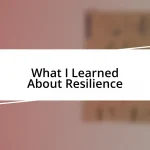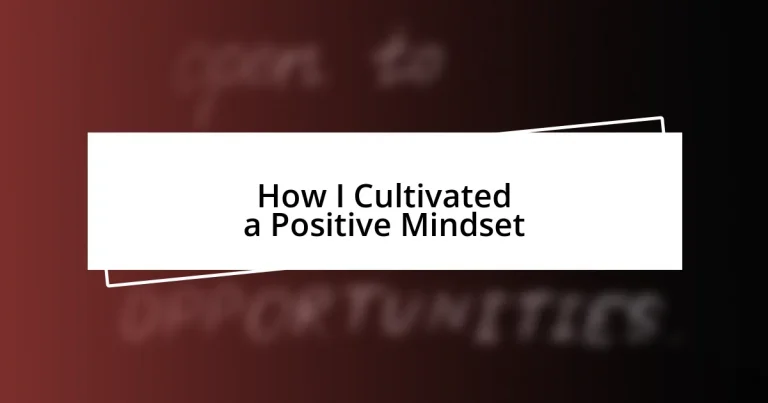Key takeaways:
- Mindset shapes our experiences; embracing a growth mindset allows us to view obstacles as opportunities for improvement.
- Recognizing and challenging negative thought patterns is crucial for cultivating a positive mindset.
- Daily gratitude practices enhance mood and relationships, reinforcing a positive outlook on life.
- Regular reflection on progress fosters self-awareness, motivation, and resilience in overcoming challenges.
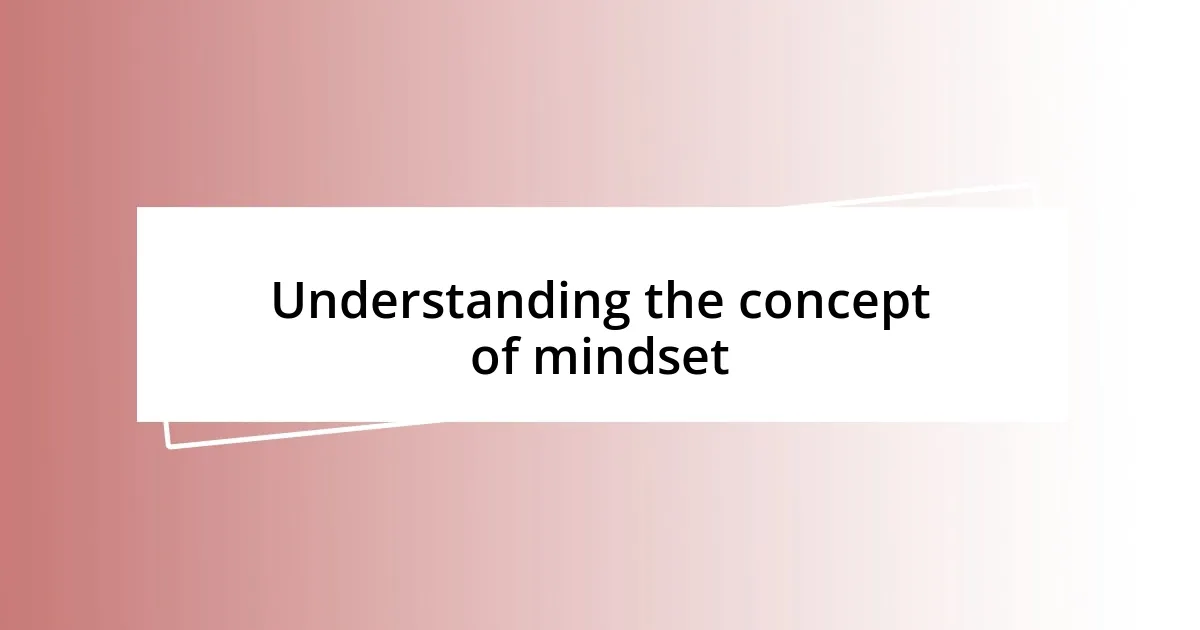
Understanding the concept of mindset
Mindset is essentially the lens through which we view our experiences, shaping our thoughts, emotions, and ultimately our actions. I remember a time when I faced a significant setback at work; instead of crumbling under pressure, I asked myself whether I could learn something from this failure. This question shifted my perspective and opened the door to growth.
When we think about our mindset, it’s crucial to recognize the difference between a fixed and a growth mindset. I used to believe my abilities were carved in stone, which held me back from pursuing new challenges. However, embracing a growth mindset enabled me to see obstacles as opportunities to improve, and this shift catapulted my personal development.
Engaging with the idea of mindset can be transformative. Have you ever noticed how a small change in thinking can lead to vastly different outcomes? For me, realizing this power allowed me to navigate life’s challenges with resilience. Recognizing that our mindset can be cultivated inspires me to keep pushing the boundaries of my potential.
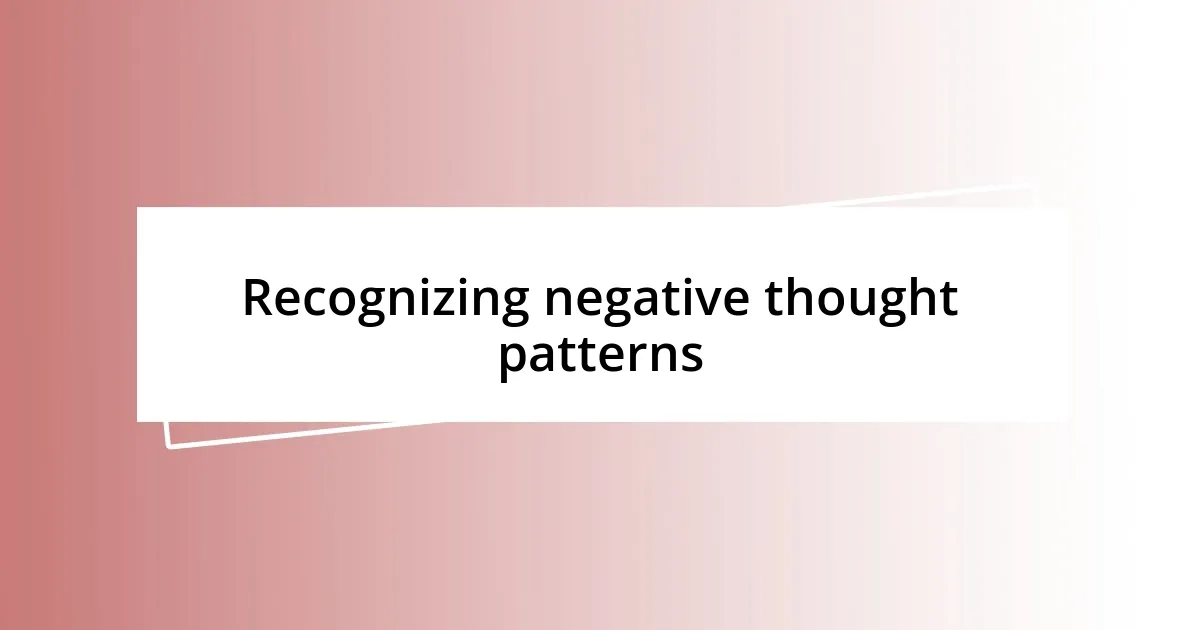
Recognizing negative thought patterns
Recognizing negative thought patterns is the first step toward cultivating a positive mindset. I can recall afternoons when I would spiral into self-doubt, thinking I wasn’t good enough to tackle a new project. These internal dialogues are often sneaky, creeping in when I’m least prepared. By identifying these thoughts, I’ve learned to challenge and redirect them.
Here are some common negative thought patterns you might find yourself experiencing:
- All-or-Nothing Thinking: Seeing situations in black and white without acknowledging the gray areas.
- Overgeneralization: Making broad conclusions based on a single event or piece of evidence.
- Catastrophizing: Expecting the worst possible outcome in every situation, amplifying fears unnecessarily.
- Disqualifying the Positive: Dismissing accomplishments or positive feedback, undermining my own efforts.
- Personalization: Blaming myself for events outside my control, which can be quite draining.
By recognizing these patterns, I can transform my mindset and embrace a healthier perspective.
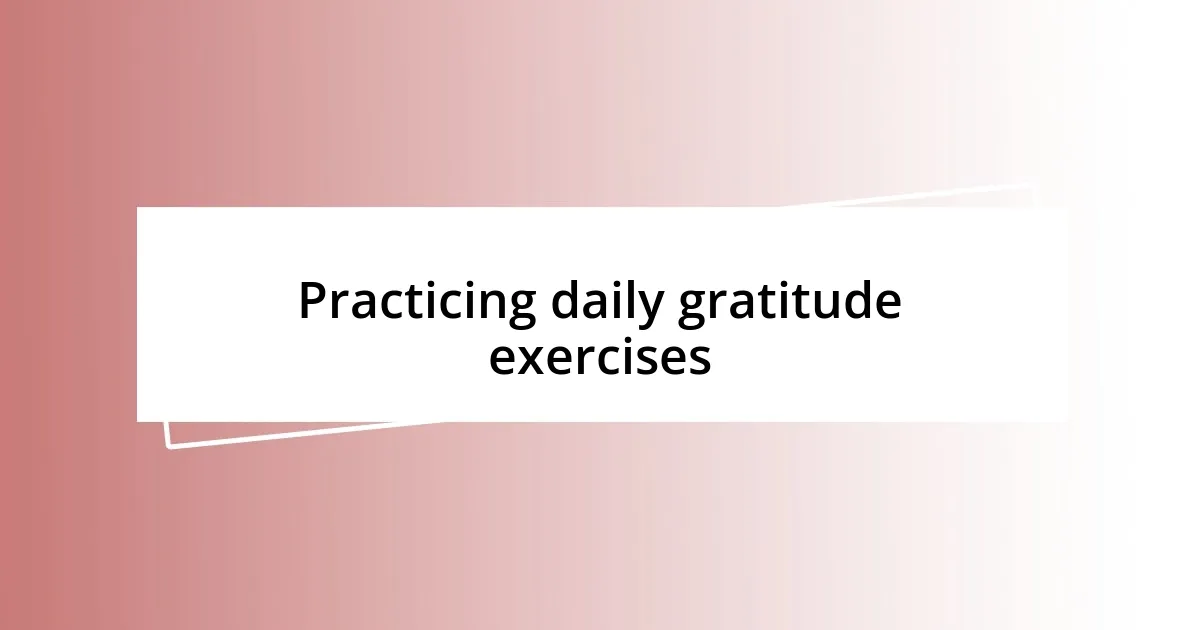
Practicing daily gratitude exercises
Practicing daily gratitude exercises has been a game changer for me. Each morning, I take a moment to reflect on three things I’m thankful for, and surprisingly, this simple ritual shifts the entire tone of my day. I remember a particularly challenging week when, despite feeling overwhelmed, listing just small joys—like a warm cup of coffee or a friendly smile—helped me regain my perspective and foster a sense of appreciation.
What I’ve noticed is that gratitude doesn’t just boost my mood; it also enhances my relationships. Expressing gratitude to colleagues or loved ones cultivates a stronger sense of connection. One day, I decided to write a heartfelt note to a mentor who had always supported me. The joy in their response reaffirmed how gratitude can ripple outward, creating a positive environment that uplifts not just us but those around us as well.
Daily gratitude exercises don’t have to be elaborate; they can be as simple as journaling before bed. I often jot down moments that made me smile during the day. These tiny reflections have a profound impact on my overall perspective, reminding me of the beauty in everyday life and training my mind to focus on the positive.
| Exercise | Description |
|---|---|
| Journaling | Writing down things you’re grateful for daily helps create a reflective habit. |
| Gratitude Notes | Sending notes or messages to express gratitude can deepen connections with others. |
| Mindful Appreciation | Taking a moment during the day to pause and appreciate your surroundings enhances awareness. |
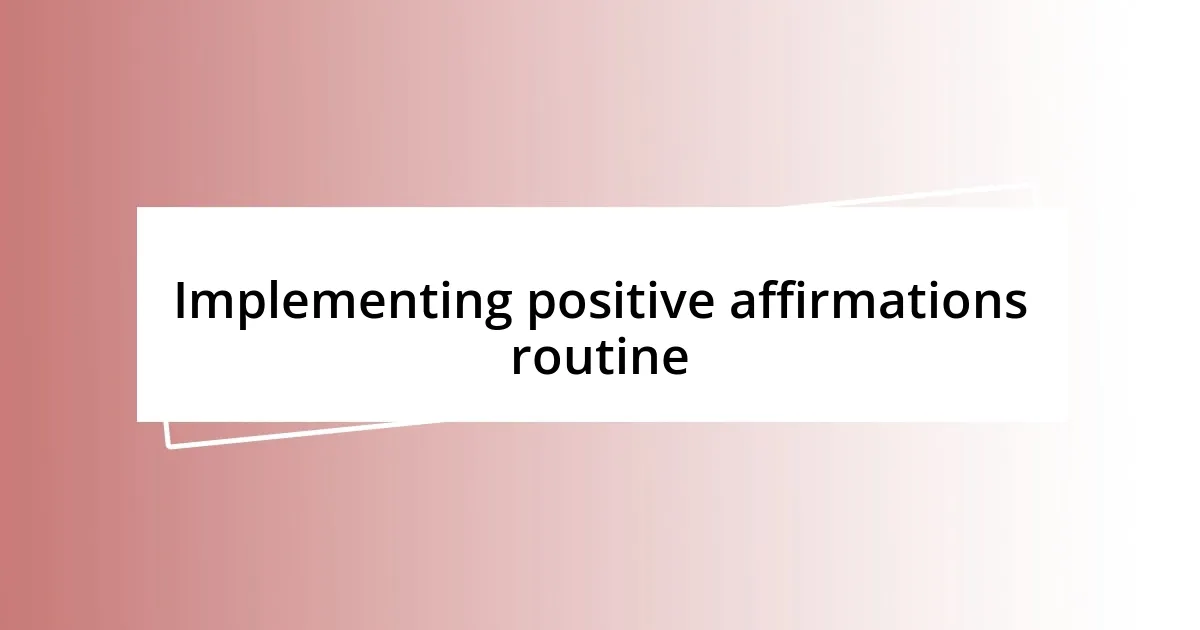
Implementing positive affirmations routine
Integrating a positive affirmations routine into my daily life has been truly transformative. I started with simple statements like “I am enough” or “I am capable.” At first, I felt a bit silly reciting them, but over time, I noticed how they began to reshape my thinking. Each time I faced a challenge, instead of sinking into self-doubt, these affirmations started to echo in my mind, reminding me of my strengths.
One memorable experience was during a difficult presentation at work. My nerves were on high alert, and anxiety threatened to overwhelm me. Remembering my affirmations, I took a deep breath and whispered to myself, “I am prepared and confident.” Surprisingly, it calmed my racing heart and helped me focus. This practice didn’t just help me through that moment; it created a foundation of self-belief. Have you ever felt an affirmation turn your day around? I know I have, time and again.
To make affirmations more effective, I recommend writing them down in a place you frequently see—like your bathroom mirror or your phone screen. I use sticky notes with my affirmations, and every morning while brushing my teeth, I read them aloud. This visual and vocal reinforcement has solidified their place in my mindset. Isn’t it fascinating to think that such simple phrases can hold so much power? Embracing this practice has fueled my journey toward a more positive mindset and empowered me in ways I never imagined.
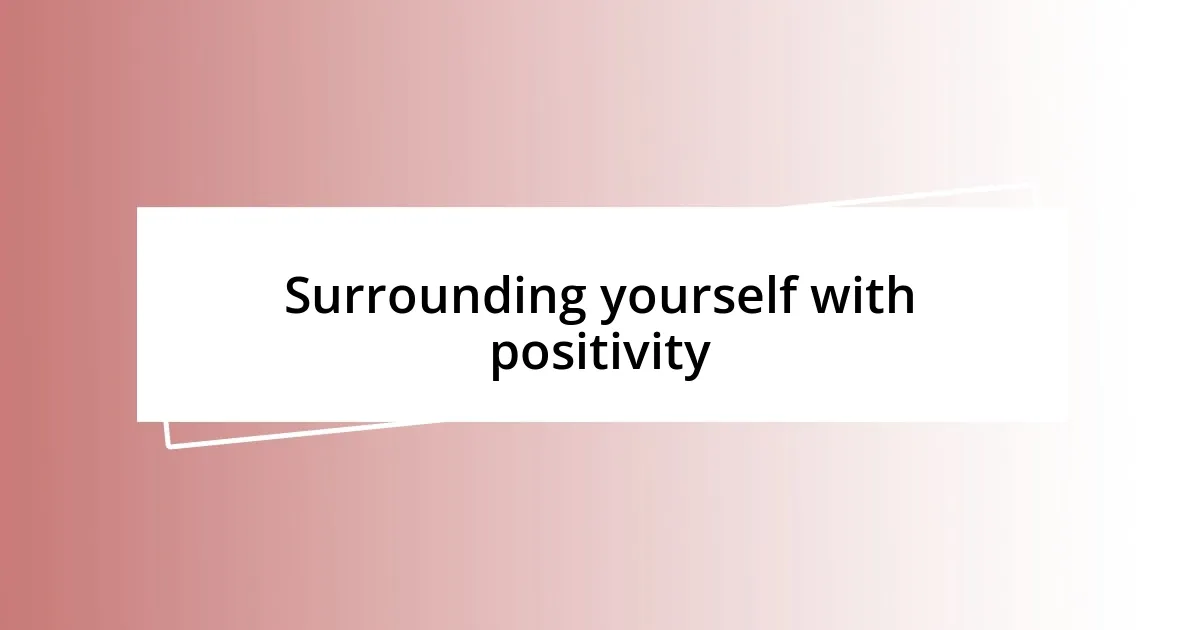
Surrounding yourself with positivity
Surrounding myself with positive influences has been essential in nurturing my mindset. I’ve found that spending time with upbeat friends and family members naturally lifts my spirits. I remember a day when I was feeling particularly low; my best friend called and insisted on a spontaneous coffee catch-up. Her infectious laughter and uplifting stories transformed my mood and reminded me of the power of shared positivity.
I’ve also made a conscious effort to minimize my exposure to negativity in media and social circles. For instance, I unfollowed social media accounts that left me feeling drained or discouraged. Instead, I filled my feed with inspiring quotes, motivational speakers, and accounts that promote kindness and growth. Have you ever noticed how the right content can shift your perspective? I certainly have; it’s like flipping a switch that brightens the room.
Learning to cultivate a positive environment isn’t always easy, but it’s so worthwhile. By intentionally surrounding myself with uplifting energy, I create a buffer against life’s stresses. When I encounter setbacks, I seek out the company of those who inspire me. Their buoyancy helps me to bounce back more quickly. In my experience, positivity breeds more positivity; when I harness that energy, I’m not just surviving—I’m thriving.
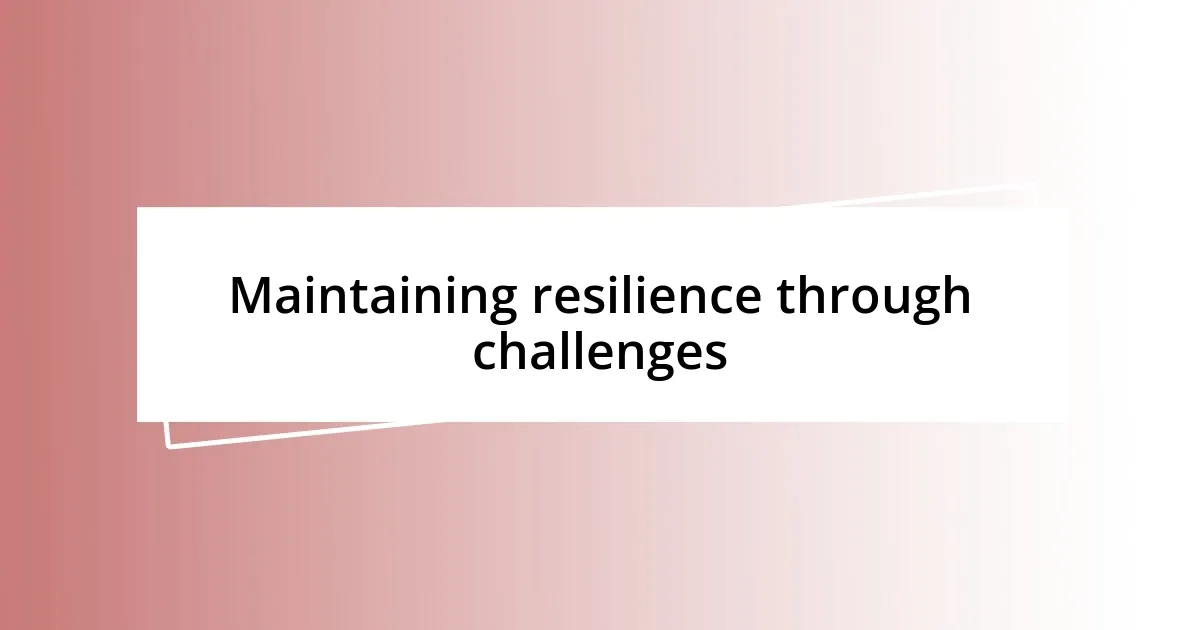
Maintaining resilience through challenges
Facing challenges often requires a deep well of resilience, something I’ve had to cultivate over time. I remember a particularly tough period when I was juggling work pressures and personal issues. Instead of letting those moments overwhelm me, I made a habit of reflecting on what I had learned from each experience. It’s intriguing to think how even the toughest obstacles can serve as valuable teachers, don’t you agree? By reframing situations as opportunities for growth, I found myself not just surviving, but actually thriving.
During another challenging time, I began embracing mindfulness practices like meditation and journaling. I found that taking a few moments each day to calm my mind and express my thoughts helped me remain grounded. Once, after a setback that stung emotionally, I sat down to write about it. That night, spilling my feelings onto the page lifted a weight off my shoulders. Have you ever poured your emotions into writing? It can be such a cathartic release! It’s fascinating how these small acts of self-care can restore my positivity and resilience.
Support systems play an equally crucial role in maintaining resilience. I’ve turned to my family and close friends during trying times, and their unwavering support has been a beacon of hope. I recall a conversation with a friend who reminded me that difficulty is often temporary, but the strength we build can last a lifetime. Isn’t it comforting to know that we don’t have to weather storms alone? I’ve learned to reach out, share my struggles, and tap into the collective strength of those around me. This connection not only nourishes my resilience but also deepens my relationships, enriching my overall mindset.
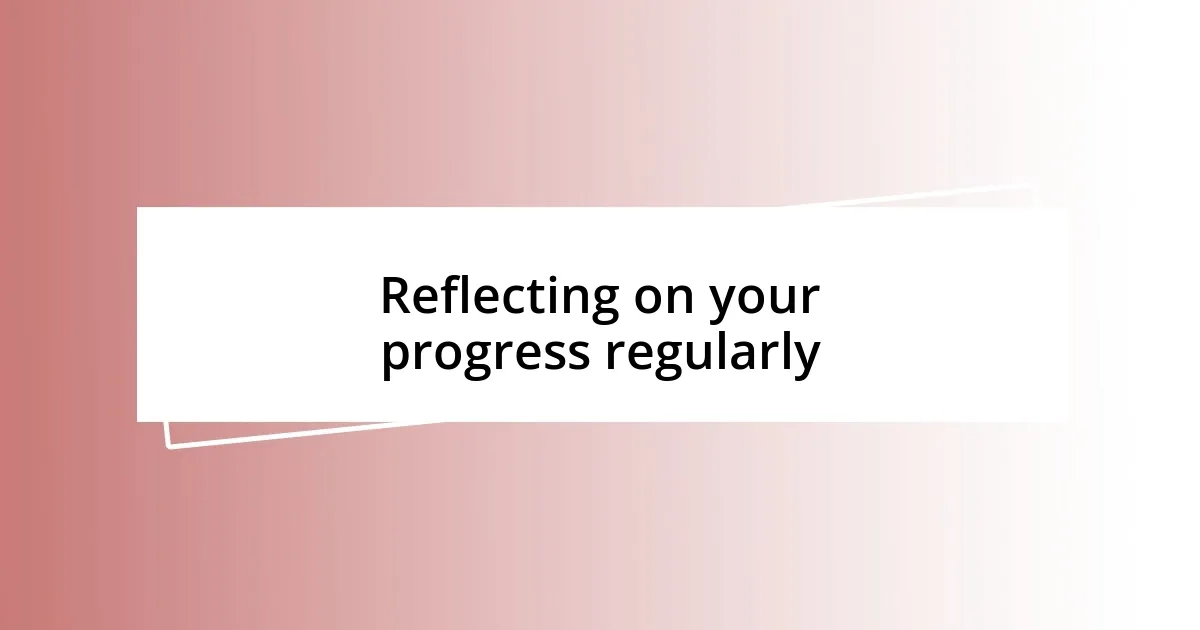
Reflecting on your progress regularly
Reflecting on my progress regularly has become a vital part of my personal growth journey. I think back to a time when I set a goal to improve my physical health. Each week, I would take a few moments to review my workouts and dietary choices, noting where I succeeded and where I stumbled. It’s surprising how acknowledging even the smallest victories can boost motivation, isn’t it? Just last month, I realized that I had managed to incorporate more fruits and vegetables into my meals, and celebrating that helped me stay committed.
Sometimes I find myself going back through old journal entries, and it’s both illuminating and humbling. Moments that once felt overwhelming now serve as reminders of how far I’ve come. The other day, I read about a period when I struggled with self-doubt. Reflecting on that time, I felt proud of the resilience I developed. Have you ever looked back and thought, “Wow, I really navigated that challenge well”? This practice of reflection not only fosters gratitude but also reinforces my belief in my ability to overcome future hurdles.
In my experience, consistency in reflection is key. I’ve set aside a specific time each week to look back on my accomplishments and setbacks. This ritual not only grounds me but also provides clarity on what strategies are working and what needs adjustment. Just last Sunday, as I reviewed my goals, I discovered that my daily affirmations were significantly enhancing my mood. Isn’t it interesting how a simple act of looking inward can lead to profound insights? By recognizing patterns in my thoughts and behaviors, I feel empowered to make informed changes that steer my mindset positively.
